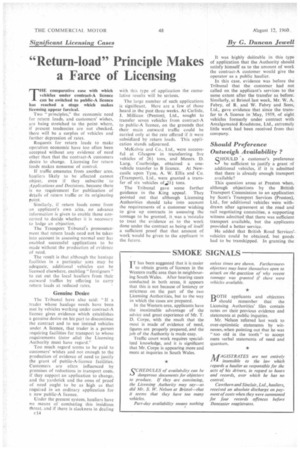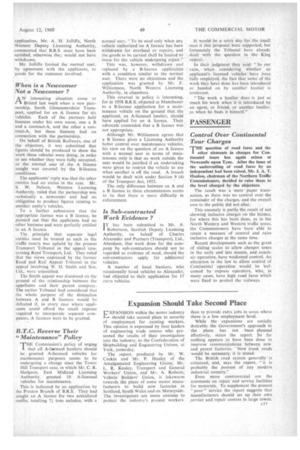"Return-load" Principle Makes a Farce of Licensing
Page 54

Page 55

If you've noticed an error in this article please click here to report it so we can fix it.
THE comparative ease with which vehkles under contract-A licence can be switched to public-A licence has reached a stage which makes licensing appear farcical.
Two "principles," the economic need for return loads, and customers' wishes, are being stretched to the point where, if present tendencies are not checked, there will be a surplus of vehicles and further depression of rates.
Requests for return loads to make operation economic have too often been accepted without any evidence of need other than that the contract-A customers desire to change. Licensing for return loads makes nonsense of control.
If traffic emanates from another area, hauliers likely to he affected cannot object, even if they subscribe to Applications and Decisions, because there is no requirement for publication or details of return traffic or its originating point.
' Similarly, if return loads come from art applicant's own ar'ea, no advance information is given to enable those concerned to decide whether it is necessary to lodge an objection. , The Transport Tribunal's pronouncement that return loads aced not be taken into account in assessing normal user has enabled successful applications to be made without the production of evidence of need.
The result is that although the haulage facilities in a particular area may he adequate, additional vehicles can be licensed elsewhere, enabling " foreigners " to cut out the local hauliers from their outward traffics by offering to carry return loads at reduced rates.
Genuine Desire
The Tribunal have also said: "If a trader whose haulage needs have been met by vehicles working under contract-A licence gives evidence which establishes a genuine desire on his part to discontinue the contract and to use instead vehicles under A licence, that trader is a person requiring facilities for transport to whose requirements (inter aim) the Licensing Authority must have regard."
Too much regard seems to be paid to customers' wishes and not enough to the production of evidence of need to justify the grant of public-A-licence facilities. Customers are often influenced by promises of reductions in transport costs. if they support an application to change, and the yardstick and the onus of proof of need ought to be as high as that required in an ordinary application for a new public-A licence.
Under the present system, hauliers have no means of combating this insidious threat, and if there is slackness in dealing c 14
with this type of application the cumulative results will be serious.
The large number of such applications is significant. Here are a few of those heard in the past three weeks. At Carlisle, J. Millican (Penton), Ltd., sought to transfer seven vehicles from contract-A to public-A licence, on the grounds that their main outward traffic could he carried only at the rate offered if it were subsidized by return loads. This application stands adjourned.
McKelvie and Co., Ltd., were successful at Glasgow in transferring five vehicles of 26+ tons, and Messrs. D. Lang, Coatbridge, obtained a onevehicle transfer to B licence. At Newcastle upon Tyne, A. W. Ellis and Co. (Transport), Ltd., were granted a transfer of six vehicles of4;.1+ tons.
The Tribunal gave some further guidance in the King appeal. They pointed out that although Licensing Authorities should take into account the requirements of a customer wishing to give up contracts in assessing the tonnage to be granted, it was a 'mistake to treat the evidence as to the work done under the contract as being of itself a sufficient proof that that amount of work would be given to the applicant in the future. It was highly dairablc in this type of application that the Authority should satisfy himself as to the amount of work the contract-A customer would give the operator as a public haulier.
In this case, evidence was before the Tribunal that the customer had not called on the applicant's services to the same extent after the transfer as before. Similarly, at Bristol last week, Mr. W. A. Febry, of R. and W. Febry and Sons, Ltd., gave evidence that since the transfer to A licence in May, 1959, of eight vehicles formerly under contract with Amalgamated Roadstonc, Ltd., extremely little work had been received from that company.
Should Preference Outweigh Availability ?
QHOULD 'a customer's preference
be sufficient to justify a grant of additional vehicles, if it is admitted that there is already enough transport available?
This question arose at Preston when, although objections by the British Transport Commission to an application by Scott's Transport Services (Preston), Ltd., for additional vehicles were withdrawn after agreement at the road and rail negotiating committee, a supporting witness admitted that there was sufficient transport available, but the applicants provided a better service.
He added that British Road Services'vehicles could be obtained, but goods had to be transhipped. In granting the
application, Mr. A. H. Jolliffc, North Western Deputy Licensing Authority, commented that B.R.S. must have been satisfied, otherwise thee would not have withdrawn.
Mr. Jolliffe limited the normal user, by agreement with the applicants, to goods for the customer involved.
When is a Newcomer Not a Newcomer ?
AN interesting situation arose at Bristol last week when a new partnership, South Gloucestershire Transport, applied for an A licence for six
vehicles. Each of the partners held licences under his own name, one a B and a contract-A, and the other a contract-A, but these licences had no connection with the partnership.
On behalf of British Railways, one of the objectors, it was submitted that figures should be produced to show the work these vehicles were doing, in order to see whether they were fully occupied, as the normal user of the A licence sought was covered by the B-licence conditions.
The applicants' reply was that the other entities had no status in the case. Mr. S. W. Nelson, Western Licensing Authority, ruled that the partnership was technically a newcomer and had no obligation to produce figures relating to another entity's vehicles.
To a further submission that the appropriate licence was a B licence, he pointed out that the applicants had no other business and were perfectly entitled to an A licence.
The principle that separate legal entities must be treated as such in the traffic courts was upheld by the present Transport Tribunal in the appeal "concerning Reed Transport, Ltd. They ruled that the views expressed by the former Road and Rail Appeal Tribunal in the appeal involving W. H. Smith and Son. Ltd., were unjustified.
The Smith appeal was dismissed on the ground of the relationship between the appellants and their parent company. The earlier Tribunal had considered that the whole purpose of the distinction between A and II licences would he defeated if, in every case where applicants could afford the small expense required to incorporate separate companies, A licences were to be granted.
B.T.C. Reverse Their "Maintenance" Policy
THE Commission's policy of urging
that all A-lieensed hauliers should be granted A-licensed vehicles for maintenance purposes seems to be undergoing a change since the Tower Hill Transport case, in which Mr. C. R. Hodgson, East Midland Licensing Authority, granted 10 A-licensed vehicles for maintenance. .
This is indicated by an application by the Preston Branch of B.R.S. They had sought an A licence for two articulated outfits, totalling it tons unladen, with a normal user, "To be used only when any vehicle authorized on A licence has been withdrawn for overhaul or repairs, and
the goods to be carried shall be limited to
those for the vehicle undergoing repair." This was, however, withdrawn and replaced by a B-licence application with a condition similar to the normal user. There were no objections and the application was granted by Mr. F. Williamson, North Western Licensing Authority, in chambers. This reversal in policy is interesting, for in 1958 B.R.S. objected at Manchester to a B-licence application for a main tenance vehicle on the ground that the applicant, an A-licensed haulier, should
have applied for art A licence. Their advocate contended that a B licence was not appropriate. Although Mr. Williamson agrees that a B licence gives •a Licensing Authority
better control over maintenance vehicles, his view on the question of an A licence with a normal user in terms of main tenance only is that no work outside the user would be justified if an undertaking were given to restrict the vehicle to use
when another is off the road. A breach would be dealt with under Section 9 (4) of the Transport Act, 1953.
The only difference between an A and a B licence in these circumstances seems to be that there is more difficulty in enforcement.
Is Sub-contracted Work Evidence ?
IT has been submitted to Mr. A. Robertson, Scottish Deputy Licensing Authority, on behalf of Charles Alexander and Partners (Transport), Ltd., Aberdeen, that work done for the company by sub-contractors should not be regarded as evidence of need, should the sub-contractors apply for additional vehicles.
A number of local hauliers, who occasionally hired vehicles to Alexander, had objected to their application for 17 extra vehicles. It would. he a sorry day forsthe email man ii this proposal were supported, but fortunately the Tribunal have already dealt with the question in the King appeal.
In their judgment they said: "In our view, when considering whether art applicant's licensed vehicles have been fully employed, the fact that some of the work they have done has been introduced or handed on by another haulie-r is irrelevant.
"The work a haulier does is just as much his work when it is introduced by an agent, or friend, or another haulier,. as when he finds it himself."
PASSENGER
Control Over Continental Tour Charges
HE question of road fares and the 1 other elements in charges for Continental tours has again arisen at Newcastle upon Tyne. After the issue of the undercutting of road fares by an independent had been raised, Mr. J. A. T. Hanlon, chairman of the Northern Traffic Commissioners, decided to raise them to the level charged by the objectors.
The result was a mere paper transaction, as there was no control over the reminder of the charges, and the overall cost to the public did not alter. This anomaly is partly the result of not showing inclusive charges on the licence, for where this has been done, as in the North Western and Western traffic areas. the Commissioners have been able to retain a measure of control and raise inclusive charges at the same time. Recent developments such as the grant of sliding scales to allow cheaper tours in the early and late season, and coachair operation, have weakened control. An alteration in the law to allow control of Continental operation would he welcomed by express operators, who, in many cases, have high road fares which were fixed to protect the railways.
















































































































